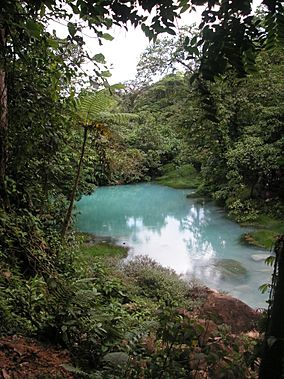Tenorio Volcano National Park facts for kids
Quick facts for kids Tenorio Volcano National Park |
|
|---|---|
|
IUCN Category II (National Park)
|
|

Celeste River within the park.
|
|
| Location | Costa Rica |
| Area | 129 km² |
| Established | 1976 |
| Governing body | National System of Conservation Areas (SINAC) |
| Lua error in Module:Location_map at line 420: attempt to index field 'wikibase' (a nil value). | |
The Tenorio Volcano National Park (in Spanish: Parque Nacional Volcán Tenorio) is a special protected area in northern Costa Rica. It is part of the larger Arenal Tempisque Conservation Area. The park gets its name from the amazing Tenorio Volcano found within its borders.
The volcano became part of the National Park in 1995. It is located about 26 miles (42 km) northeast of Fortuna town. This area is in the Guanacaste Province of Costa Rica.
One of the most famous sights here is the Rio Celeste, or "Sky Blue River." This river looks bright blue because of tiny particles from the volcano's sulphur and calcium carbonate. These particles scatter light, making the water appear blue.
The park is full of natural wonders. You can find hot springs and small geysers bubbling up from the ground. There are also many rivers, beautiful waterfalls, and calm lagoons. From certain spots, you can enjoy amazing views of the landscape.
Contents
What Kinds of Forests Grow Here?
The higher parts of the park are covered by a type of forest called a cloud forest. These forests are often misty and cool. The lower areas of the park have a rain forest, which is warm and wet. Both types of forests are home to many different plants and animals.
What Animals Live in Tenorio Park?
Tenorio Volcano National Park is a safe home for many wild animals. You might spot a tapir, which is a large mammal that looks a bit like a pig with a short trunk. The park is also home to the puma, a large wild cat. Pumas are shy and rarely seen, making it a special treat if you spot one!
Visiting Tenorio Volcano National Park
If you visit the park, you can find a ranger station at the base of the volcano. Park rangers are there to give you helpful information and answer your questions. They can tell you about the trails and what to see.
You can hike to the top of the volcano using the Lago Las Dantas Trail. This path goes through the thick forest and leads all the way to the peak. It's a great way to explore the park's natural beauty.
Tenorio Valley Nature Reserve
Next to the Tenorio Volcano National Park is the Tenorio Valley Nature Reserve. This area used to be a cattle ranch. In 2004, it was changed into a nature reserve. This process is called rewilding, where land is restored to its natural state.
The nature reserve has a 20-acre (8-hectare) wetland. This wetland is the only known place where a special frog lives. It's called the Tapir Valley tree frog (Tlalocohyla celeste). Protecting this wetland helps keep these unique frogs safe.
Images for kids
See also
 In Spanish: Parque nacional Volcán Tenorio para niños
In Spanish: Parque nacional Volcán Tenorio para niños
 | Janet Taylor Pickett |
 | Synthia Saint James |
 | Howardena Pindell |
 | Faith Ringgold |


